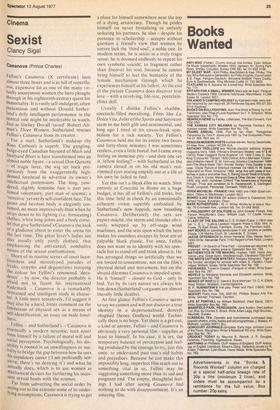Cinema
Sexist
Clancy Sigal
Casanova (Prince Charles)
.Fellini's Casanova (X certificate) lasts almost three hours and is as full of superfluous, expensive fat as one of the many virtually anonymous women the hero ploughs through in his eighteenth-century quest for Immortality. It is vastly self-indulgent, often Pretentious and without Donald Sutherland's drily intelligent performance in the Central role might be intolerable to watch. Just as Shelley Duvall 'saved' Robert Altman's Three Women, Sutherland rescues Fellini's Casanova from its creator.
For a start, Sutherland's makeup (by Rino Carboni) is superb. The gangling, huige_eyed Canadian hayseed of Mash and Steelyard Blues is here transformed into an almost noble figure a sexual Don Quixote of tragic farce, the wig set back precariously from the exaggeratedly highdomed forehead to advertise its owner's Intellectual pretensions. The long, powd.ered, slightly feminine face is part per'limed voluptuary, part man of science; a 'sensitive' yet eerily self-confident face. The gaunt and hesitant body is elegantly costumed, no more impressively. than when he strips down to his fighting (i.e. fornicating) Clothes, white long-johns and a body corselet that give Sutherland's Casanova the look Of a gladiator about to enter the arena for ' the last time, The great lover's ladies are also usually only partly clothed, thus emphasising the anti-carnal, combative nature of the sexual confrontation.
Shorn of its routine scenes of court licentiousness and stereotyped parades of :freaks, cripples and degenerates trooping the colour for Fellini's renowned 'decadence' by now, the director probably is afraid not to flaunt his international trademark Casanova is a remarkably restrained and intelligent study in character. A little more tentatively, I'd suggest it may also be a lucid, bitter comment on the limitations of physical sex as a means of s,elf-identification, an essay on male loneliness.
Fellini and Sutherland's Casanova is e,ssentially a modern neurotic, torn apart 1rom himself by a failure of moral will and social perception. Psychologically, his disability is rooted in an unwillingness or inab!lity to bridge the gap between how he sees hts copulatory career CI am profoundly sensitive, there's no denying it') and what he actually does, which is to use women as mechanical devices for furthering his incessant sexual bouts with the cosmos.
Far from subverting the social order by acting out to the extreme some of its underlYing assumptions, Casanova is trying to get a place for himself somewhere near the top of a dying aristocracy. Though he prides himself on never brutalising or unfairly seducing his partners, he also despite his pretence to scholarship accepts without question a friend's view that women by nature lack the 'third soul', a noble one. In modern terms, he is sexist in a truly tragic sense: he is doomed endlessly to repeat his own symbolic suicide', to fragment rather than discover his soul, because he cannot bring himself to feel the humanity of the female mechanism through which he experiences himself at his fullest, At the end of the picture Casanova does discover true love with a revolving, life-size, porcelainchina doll.
Usually I dislike Fellini's shalldw, spectacle-filled moralising. Films like La Dolce Vita, Juliet o fate Spirits and Satyricon seem to me both glib and sentimental, and long ago I tired of , his circus-freak symbolism for a sick society.. Yet Fellini's Casanova held me for its entire two hours and forty-three minutes; I was sometimes restless, even a little bored, but I came away feeling an immense pity and dare one say it, fellow feeling? with Sutherland as the camera closed in on his old man's redrimmed eyes staring emptily out at a life of his own he failed to find.
Yet this isn't a bleak .film to watch. Shot entirely at Cinecitta in Rome on a huge budget, it has all of Fellini's old tricks, but , this time held in check by an emotionally coherent vision superbly embodied by Sutherland's now foppish, now brooding Casanova. Deliberately the sets are papier-mache, the storm and thunder obviously whipped up by off-stage wind machines, and the seas upon which the hero makes his countless escapes by boat are of palpable black plastic. For once, Fellini does not want us to identify with his spectacle but to stand off and think about it. He has arranged things so artificially that we are forced to concentrate, not on the film's physical detail and movement, but on the absurd dilemma Casanova is impaled upon. He is 'himself' closest to God only in bed. Yet by its very nature sex always lets him down (Sutherland's orgasms are almost literally little deaths).
At first glance Fellini's Casanova sgems to say we cannot and will not discover a true identity in a depersonalised, demyth ologised (hence Godless) world. Technically there is no hope. Yet there is a get-out, a kind of answer, Fellini and Casanova is Obviously a very personal film -supplies at least to himself, In his case, it is art, the
temporary balance of percemion and feeling produced by the courage 'to try, just this once, to understand past one's old habits and prejudices. Because he can make this impossibly long, imperfect film reach out to something vital in us, Fellini may be
suggesting something more than its sad and poignant end. The empty, thoughtful feelings I had after seeing Casanova had nothing to do with disappointment. It's an amazing film.


































 Previous page
Previous page